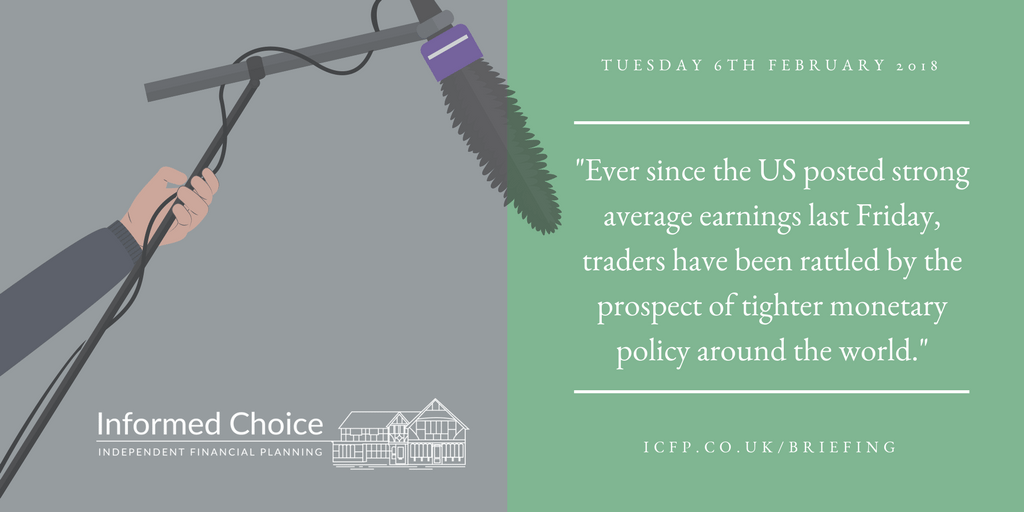In this edition of The Briefing from Informed Choice on Tuesday 6th February 2018 – equity market falls to two-month low, profits rise at BP, financial services trade agreement warning, tough conditions for retailers in January, and call for bitcoin crackdown.
Subscribe to The Briefing by email
Equity market falls to two-month low
Company shares in London finished down on Monday with the FTSE 100 index falling to its lowest level in two months. Investors are concerned about the prospect for higher interest rates and rising bond yields.
The FTSE 100 index closed on Monday down 1.5%, or 108.45 points at 7,334.98 points.
European markets opened lower on Tuesday, following an overnight sell off in Asian equity markets, with Japan’s Nikkei 225 closing down 4.7%.
David Madden, market analyst at CMC Markets, said:
European markets are firmly in the red as the global sell-off in stocks has taken hold. Ever since the US posted strong average earnings last Friday, traders have been rattled by the prospect of tighter monetary policy around the world.
Economic indicators in the US, Europe, and Asia point for a need to tighten up monetary policies from various central banks.
Pound Sterling also fell on Monday, by 0.7%, following the publication of a survey showing a slowing British economy and negative news about ongoing Brexit negotiations.
Profits rise at BP
Annual profits at oil giant BP more than doubled last year, due largely to the global oil price increase. BP made profits of $6.2bn, up from $2.6bn in 2016.
Oil production at BP rose by 12% last year, to 247 million barrels a day. They opened seven new oil and gas fields, in what they described as one of their strongest ever years.
BP Chief executive Bob Dudley said:
We enter the second year of our five-year plan with real momentum. We are increasingly confident that we can continue to deliver growth across our business, improving cash flows and returns for shareholders out to 2021 and beyond.
Financial services trade agreement warning
Financial Conduct Authority chief executive Andrew Bailey has warned of “serious” consequences for global markets unless the European Union enters talks on a financial services trade agreement with the UK.
Speaking at an event in London on Monday, Bailey said he did not buy Brussels’ position that frictionless cross-border trade between banks post-Brexit would be impossible to achieve. He described the “mutual interest” in forming a new arrangement, with £26 trillion worth of derivative contracts and 36 million cross-border insurance policies at risk if the two parties could not reach an agreement.
Bailey said:
It’s not for me to opine on fishing policy. But, the key point is that this sounds like the fishing equivalent of open financial markets.
Whatever view you take on Brexit, I think we all agree that financial stability comes first as a common objective.
Tough conditions for retailers in January
The retail sector faced ‘tough’ conditions in January, according to the latest figures from the British Retail Consortium and KPMG.
Like-for-like retail sales grew by 0.6% last month, compared with a 0.6% fall last January. Total sales were up 1.4%, compared with 0.1% growth in the same month last year.
Helen Dickinson, BRC chief executive, said:
The persisting tough trading environment played out at the start of the year with a mixed set of trading updates and subsequent announcements.
Sales as well as profits are seemingly harder to come by.
Against this challenging backdrop, 2018 didn’t have a bad start during what is traditionally a lean month, with sales creeping up in line with the year’s average.
Call for Bitcoin crackdown
The Head of the Bank for International Settlements has said central banks must prepare to act against cryptocurrencies to ensure they do not become entrenched and undermine trust in central banks.
Agustin Carstens, general manager of the BIS, said cryptocurrencies were “probably not sustainable as money” and failed the “basic textbook definition” of what it means to be a currency.
Speaking in Frankfurt, Carstens said:
There is a strong case for policy intervention.
These assets can raise concerns related to consumer and investor protection. Appropriate authorities have a duty to educate and protect investors and consumers, and need to be prepared to act.
Private digital tokens masquerading as currencies must not subvert this trust in central banks.
Carstens described bitcoin as “a combination of a bubble, a Ponzi scheme and an environmental disaster”, making reference to the massive energy requirements of digital currency ‘mining’.
Subscribe to The Briefing by email
 Informed Choice Radio provides a regular personal finance and investment news summary, with an updated Flash Briefing for your Alexa enabled device. Search for Informed Choice Radio in your Amazon Alexa app or visit https://www.amazon.co.uk/Informed-Choice-Radio/dp/B074DZZ1MF/ to enable this Flash Briefing.
Informed Choice Radio provides a regular personal finance and investment news summary, with an updated Flash Briefing for your Alexa enabled device. Search for Informed Choice Radio in your Amazon Alexa app or visit https://www.amazon.co.uk/Informed-Choice-Radio/dp/B074DZZ1MF/ to enable this Flash Briefing.


